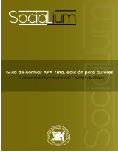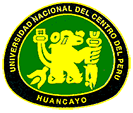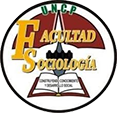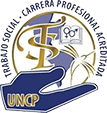Research training and attitude towards scientific research in social sciences students from the Universidad Nacional del Centro del Perú
DOI:
https://doi.org/10.26490/uncp.sl.2019.3.1.521Keywords:
research training, attitudes towards researchAbstract
The purpose of this research was to determine and know the relationship between the level of research training and the level of attitude toward scientific research in social science students from the Universidad Nacional del Centro del Perú. The research level was descriptive-correlational non-causal, basic type, non-experimental cross-sectional correlational ex-post-facto design; the instruments were a test for the variable of research training and the Likert scale inventory for the variable of attitude towards scientific research. For the validity of the instruments, 5 experts' judgment was applied and the results with the Cronbach’s alpha model (α = 0.796). For the reliability, the pilot test was used and the results obtained with the same model (α = 0.7654). The units of analysis were the students from the tenth semester of the careers of Anthropology, Communication Sciences, Sociology and Social Work; the study population was of 1493 students, and the sample, non-probabilistic and intentional type, of 141. The result for the demonstration of the relationship between the level of research training and the level of attitude toward scientific research was performed by linear regression, accepting that there is no relationship. It was concluded that there is no significant relationship between the study variables.
Downloads
References
Aldana, G., y Joya (2011). Actitudes hacia la investigación científica en docentes de metodología de la investigación. Tabula Rasa, 14, 297-309. Recuperado de http://www.scielo.org.co/pdf/tara/n14/n14a12.pdf
Barra, E. (1998). Psicología social. Concepción, Chile: Universidad de Concepción. Recuperado de http://repositorio.udec.cl/bitstream/handle/11594/717/Psicologia_Social.pdf?sequence=1&isAllowed=y
Cabanillas, G. (2006). Didáctica universitaria. Ayacucho: Universidad Nacional de San Cristóbal de Huamanga, Facultad de Ciencias de la Educación.
Inciarte, A., y Canquiz, L. (2009). Una concepción de formación integral. Revista de Artes y Humanidades UNIC, 10(2), 38-61. Recuperado de http://www.redalyc.org/pdf/1701/170118863003.pdf
Núñez, M. y Vega, L. (2011). La formación investigativa y la tesis de pregrado para obtener la licenciatura en educación. Investigación Educativa, 15(28), 31-56. Recuperado de http://www.acuedi.org/ddata/3998.pdf
Piscoya, L. (2009). El proceso de la investigación científica. Un caso y glosario. Lima: Fondo Editorial de la Universidad Inca Garcilaso de la Vega.
Rojas, G., y Aguirre, S. (2015). La formación investigativa en la educación superior en América Latina y El Caribe: una aproximación a su estado del arte. Revista Eleuthera, 12, 197-222. 10.17151/eleu.2015.12.11.
Román, M. (2005). Competencias y perfiles profesionales en la sociedad del conocimiento. Lima: Editorial El amigo.
Sánchez, S. (2016). Actitudes hacia la investigación en alumnos y docentes universitarios de Tuxtla Gutiérrez, Chiapas (Tesis de posgrado). Universidad de Montemorelos, México. Recuperada de http://dspace.biblioteca.um.edu.mx/xmlui/bitstream/handle/20.500.11972/706/Tesis%20de%20Samuel%20Haroldo%20S%c3%a1nchez%20P%c3%a9rez.pdf?sequence=1&isAllowed=y
Sierra, R. (1995). Tesis doctorales y trabajos de investigación científica. Metodología general de su elaboración y documentación. Madrid: Editorial Paraninfo.
Yarlequé, L. (2007). Investigación en educación y en ciencias sociales. Huancayo: Editorial Omega.








.jpg)












